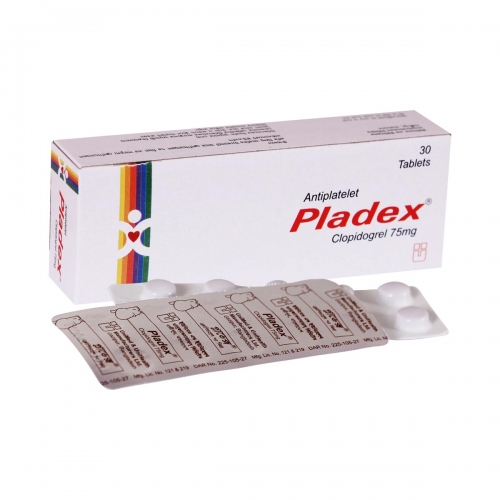ঔষধের বিস্তারিত বা বিকল্প ঔষধ জানতে ঔষধের নাম দিয়ে সার্চ দিন। যেমন- Napa বা Alatrol বা Amodis
Pladex 75mg
TabletClopidogrel Bisulphate
Unimed Unihealth MFG. Ltd
Other Strength:
- Pladex-A 75mg+75mg
Alternative:
- Odrel 75mg
- DCLOT 75mg
- Lopirel 75mg
- Anclog 75mg
- Replet 75mg
- Preclot 75mg
- Clorel 75mg
- Clopidol 75mg
- Clocard 75mg
- Dogrel 75mg
- Clogrel 75mg
- Plagrin 75mg

Pladex
Presentation
Pladex tablet: Light brown, barrel shaped, film coated tablet; each tablet contains clopidogrel bisulfate equivalent to clopidogrel INN 75mg.
Indications
Clopidogrel bisulfate is indicated for the prevention of atherosclerotic events in patients with history of symptomatic atherosclerotic disease (ischaemic stroke, myocardial infarction of established peripheral arterial disease). Clopidogrel is an antiplatelet drug. Antiplatelet drugs decrease platelet aggregation and may inhibit thrombus formation in the arterial circulation, where anticoagulants have little effect.
Dosage and administration
In acute coronary syndrome : Loading dose: 300mg (4 tablets) once daily. Maintenance dose : 75mg (1 tablet) once daily.
Contraindications, warnings etc.
Contraindications: The use of clopidogrel is contraindicated in the following conditions: Hypersensitivity to the drug substance or any component of the product. Active pathological bleeding such as peptic ulcer or intracranial haemorrhage.
Precautions: Clopidogrel should be avoided for the first few days after myocardial infarction and for seven days after ischaemic disease. Clopidogrel is not recommended in unstable angina, coronary artery bypass grafting and percuteneous transluminal coronary angioplasty. Clopidogrel is not recommended in patients at risk of increased bleeding from trauma, surgery or other pathological conditions. Clopidogrel should be discontinued seven days before surgery if antiplatelet effect is not desirable.
Gl Bleeding: Clopidogrel prolongs the bleeding time. Clopidogrel should be used with caution in patients who have lesions with a propensity to bleed (such as ulcers). Drugs that might induce such lesions such as aspirin and other nonsteroidal anti-inflammatory drugs (NSAIDs) should be used with caution in patients taking clopidogrel.
Use in Hepatically Impaired Patients: Experience is limited in patients with severe hepatic disease, who may have bleeding diatheses. Clopidogrel should be used with caution in this population.
Drug Interactions: Aspirin: Aspirin did not modify the clopidogrel-mediated inhibition of ADP-induced platelet aggregation. Concomitant administration of 500mg of aspirin twice a day for 1 day did not significantly increase the prolongation of bleeding time induced by clopidogrel. Clopidogrel potentiated the effect of aspirin on collageninduced platelet aggregation. Heparin: In a study in healthy volunteers, clopidogrel did not necessitate modification of the heparin dose or alter the effect of heparin on coagulation. Coadministration of heparin had no effect on inhibition of platelet aggregation induced by clopidogrel. The safety of this combination has not been established, however, and concomitant use should be undertaken with caution. effect of the drug may be enhanced in the post-sympathectomy patient.
Nonsteroidal Anti-Inflammatory Drugs (NSAIDs): In healthy volunteers receiving naproxen, concomitant administration of clopidogrel was associated with increased occult gastrointestinal blood loss. NSAIDs and clopidogrel should be coadministered with caution. Warfarin: The safety of the coadministration of clopidogrel with warfarin has not been established. Consequently, concomitant administration of these two agents should be undertaken with caution.
Use in pregnancy and lactation: Pregnancy: There are, however, no adequate and wellcontrolled studies in pregnant women. Because animal reproduction studies are not always predictive of a human response, clopidogrel should be used during pregnancy only if clearly needed. Lactation: It is not known whether this drug is excreted in human milk. Because many drugs are excreted in human milk and because of the potential for serious adverse reactions in nursing infants, a decision should be made whether to discontinue nursing or to discontinue the drug, taking into account the importance of the drug to the nursing woman.
Paediatric Use: Safety and effectiveness in the pediatric population have not been established. Adverse reactions: The clinically important adverse reactions are as follows: Gastrointestinal haemorrhage, agranulocytosis dyspepsia, gastritis, constipation, diarrhoea, rash, palpitation, vomiting, paresthesia, neuralgia, gout, arthritis, clotting disorder, anaemia, anxiety, insomnia, cataract, conjunctivitis, leukopenia, granulocytopenia, urticaria.
Pharmaceutical precautions
Store in a cool and dry place, protected from light.
Package quantities
Pladex Tablet: Cartons of 30 tablets in blister pack.
এই পাতাটি ১০৯ বার দেখা হয়েছে
রাজডক কী?
ফ্রী সদস্য হোন Click Here
ডাক্তার হিসাবে যোগদান করতে Click Here
নার্স / টেকনোলজিস্ট হিসাবে যোগদান করতে Click Here
ফ্রী সদস্য হোন Click Here
ডাক্তার হিসাবে যোগদান করতে Click Here
নার্স / টেকনোলজিস্ট হিসাবে যোগদান করতে Click Here

